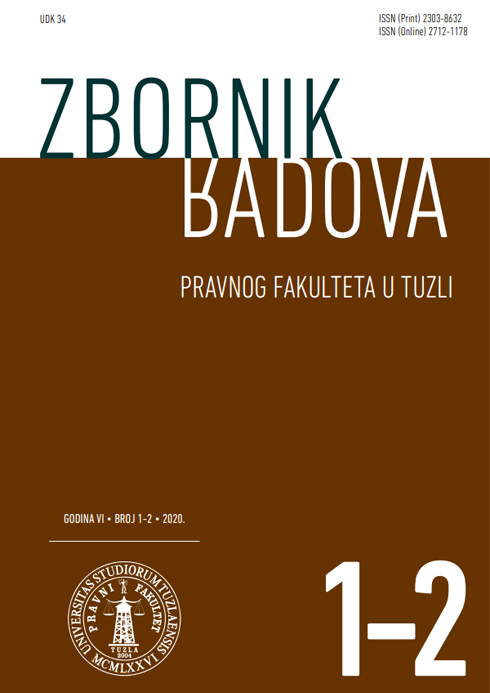SPORAZUMI O PRIZNANJU KRIVNJE ZA RATNE ZLOČINE U BOSNI I HERCEGOVINI: IZMEĐU POKAJANJA I KONSENZUALNE PRAVDE
PLEA BARGAININGS FOR WAR CRIMES IN BOSNIA AND HERZEGOVINA: BETWEEN REPENTANCE AND CONSENSUAL JUSTICE
Author(s): Vedad GurdaSubject(s): Criminal Law, International Law
Published by: Pravni fakultet Univerziteta u Tuzli
Keywords: Bosnia and Herzegovina war crimes; plea bargaining; International Criminal Tribunal for the former Yugoslavia; universal jurisdiction;
Summary/Abstract: One of the contemporary tendencies in the development of criminal procedural law is the introduction of simplified (summary) forms of criminal procedure, aimed at accelerated resolution of criminal disputes and reducing the number of criminal cases. Among the most common forms of simplified procedure in comparative law are institute of the plea bargaining (plea agreement), which represents a settlement sui generis between the prosecutor and the suspect/accused, under which the prosecutor offers to accused certain procedural benefits in exchange for a guilty plea to committed crime. These benefits, for example, can be reflected in proposing a more lenient qualification of the crime, or withdrawing certain elements in the charge, proposing the imposition of lenient criminal sanctions etc. There are many arguments pro et contra application of the institute in question. It is undoubted that the application of a plea bargaining contributes to a faster resolution of criminal cases and to a reduction of the costs of criminal proceedings, and at the same time such a confession, especially if it is accompanied by sincere repentance, can be a significant satisfaction for victims, etc. On the other hand, the settlement of parties in criminal proceedings can significantly jeopardize the processes of establishing material truth and corrective justice, especially in war crimes criminal proceedings. These paper presents basic information on war crimes prosecutions in Bosnia and Herzegovina and analyzes the legal framework for its implementation, as well as the advantages and disadvantages of a plea bargaining. Statistical indicators were collected and discussed on the scope of the plea bargaining in war crimes committed in Bosnia and Herzegovina, which have been conducted before the International Criminal Tribunal for the former Yugoslavia (ICTY), Serbian and German judiciaries, as well as courts in Bosnia and Herzegovina. It was found that about one-quarter of those convicted by the ICTY have previously concluded an agreement with The Hague Prosecution. In addition, the plea bargaining (plea agreement) applies to war crimes cases to a large extent in the courts of Bosnia and Herzegovina, where, interestingly, the scope of its application in relation to these crimes is at the level of the average application of this institute of all crimes prosecuted by the courts in Bosnia and Herzegovina, and is around 10%. The somewhat smaller scope of the plea agreement for war crimes in Bosnia and Herzegovina has been reported by the courts in the Republic of Serbia.
Journal: Zbornik radova Pravnog fakulteta u Tuzli
- Issue Year: 6/2020
- Issue No: 1-2
- Page Range: 22-60
- Page Count: 39
- Language: Bosnian

